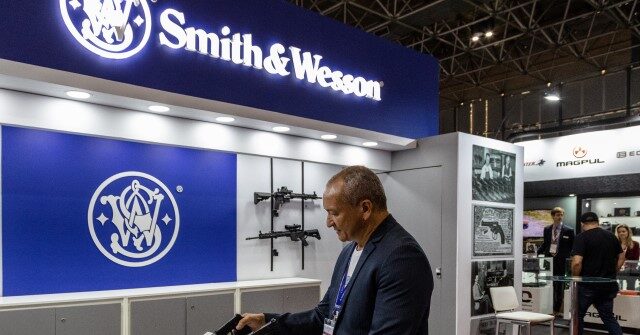The Supreme Court of the United States (SCOTUS) has recently agreed to hear the case involving Smith & Wesson and their fight against a significant $10 billion lawsuit brought by the Mexican government. This lawsuit, initially reported by Breitbart News in August 2021, targets multiple American gun manufacturers and one wholesaler. The Mexican government argues that these companies contribute to the rampant gun violence within its borders by enabling the illegal trafficking of firearms, primarily to drug cartels and criminal organizations. The lawsuit emphasizes that a staggering percentage of firearms recovered at crime scenes in Mexico — estimated between 70% to 90% — originated from the United States, creating a direct link between American gun manufacturers and the violence associated with drug trafficking in Mexico.
The case identifies several defendants, including prominent gun manufacturers such as Beretta, Glock, Colt, Ruger, Century Arms, and Barrett, alongside Interstate Arms, a wholesaler from the Boston area that distributes these manufacturers’ products across the United States. The Mexican government characterizes these entities as collaborators in the proliferation of illegal firearms that endanger public safety in Mexico. The implication is that these companies engage in practices that facilitate the unlawful transfer of their firearms into the hands of criminals and cartels. With the number of defendants eventually rising to eight, the gravity of the situation underscores a broader concern about the responsibility of gun manufacturers concerning their products’ impact on international crime and violence.
In a ruling on August 7, 2024, U.S. District Judge Dennis Saylor dismissed a significant portion of the lawsuit, subsequently limiting the scope of claims against the entities involved. Nevertheless, even after this decision, Smith & Wesson and a major defendant, Witmer Public Safety Group, remain embroiled in the legal battle. This partial dismissal reflects the complex legal dynamics at play and indicates that courts will be tasked with interpreting the reach of liability for gun manufacturers regarding criminal misuse of their products. As the legal situation unfolds, the focus on how these manufacturers can be held accountable for the impacts of their sales on foreign crime has gained national attention and sparked further debate around gun control and manufacturer responsibility.
On October 4, 2024, SCOTUS made headlines by announcing its intention to review the case presented by Smith & Wesson and Interstate Arms, which seeks to dismiss Mexico’s accusations of complicity in illegal firearm trafficking. The Supreme Court’s decision to hear the case showcases the rising importance of the intersection between gun rights and international crime. As the Justices prepare to weigh the arguments, the outcome could have far-reaching consequences for the firearms industry, the legal framework surrounding gun sales, and how liability is assessed when firearms are trafficked illegally into foreign nations plagued by crime.
The implications of this case extend beyond just legal precedent; they resonate with broader societal debates regarding gun ownership, regulation, and public safety. Advocates for stricter gun control often cite the violence fueled by easy access to firearms as a primary concern, while defenders of Second Amendment rights argue for the importance of protecting individual liberties. This case thus captures the essence of these national conversations, positioning the Supreme Court at the forefront of a critical issue that could influence legislative and regulatory approaches to gun control in the future.
As the proceedings move forward, various stakeholders, including gun rights advocates, public safety officials, and international relations experts, are watching closely. The outcome of this lawsuit holds implications not just for the parties involved, but also for how countries approach transnational issues related to criminality and the responsibilities of businesses that operate across borders. With the stakes being as high as they are, this case represents a pivotal moment in grappling with the tangible impacts of the American gun industry on global safety challenges, particularly in countries directly affected by organized crime.

